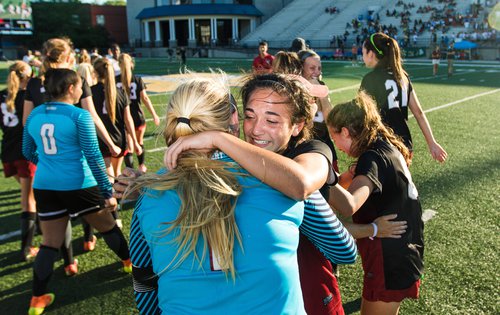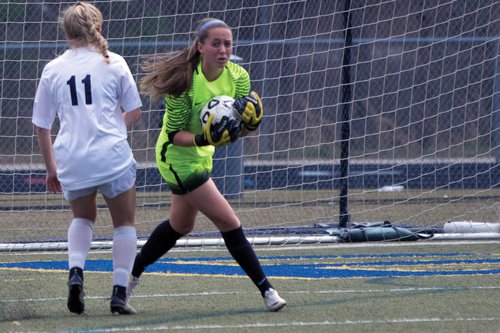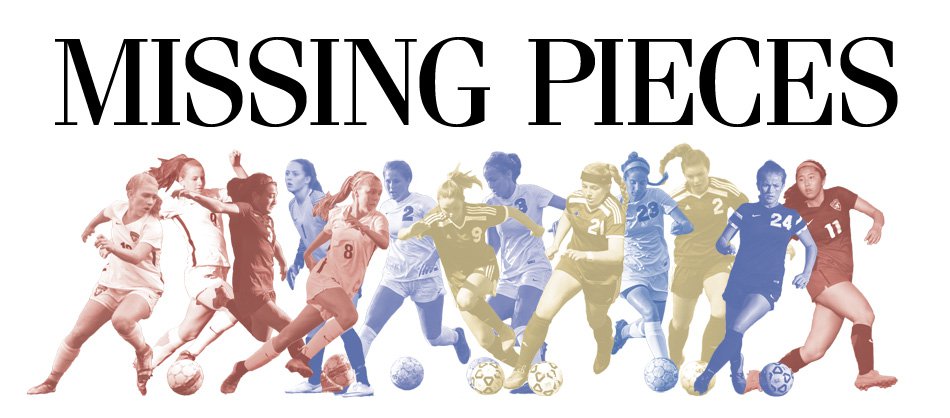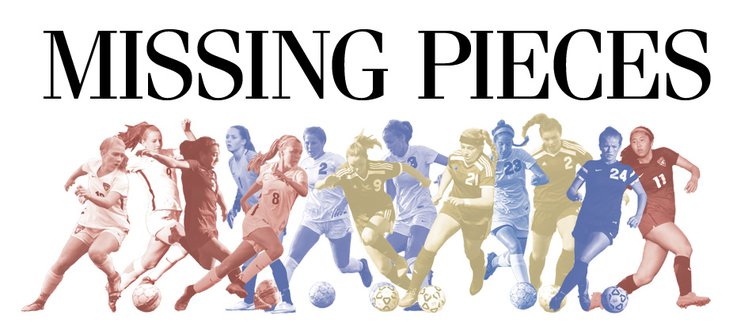On a sunny Saturday in May, Alisa Barr had her right hand on a trophy and both of her feet in the air.
Her soccer career had reached its peak roughly 20 minutes prior, when Barr tracked down a long free kick and scored the extra-time goal that gave the Lambert girls soccer team a 2-1 win over Grayson in the Class 7A state championship game. In the post-game celebration, Barr’s teammates circled around and lifted her off the ground as she clutched the Longhorns’ hardware.
That state championship win came just in time for Lambert, for the three seniors on that team but also for the young, hyper-talented group that drove the group’s dominant late-season run. Even in the postgame afterglow, the Longhorns recognized the scope of the losses to come.
“We’re expecting to lose a lot,” Longhorns defender M.E. Craven said that day.
So on a cloudy Wednesday in February, two games into her final high school season, Barr stood on Lambert’s indoor track, with the Longhorns’ current team warming up in the background, and surveyed a sport that has been reshaped completely.
Heavy losses
Lambert lost seniors Maddie Eddleman, Jordyn Ebert and Daniela Conroy to graduation after the 2017, but also gone in 2018 are sophomores Sydney Hennessey and Madison Haugen and juniors Brooke Schuyler, Megan Hong and Ellie Prybylski. Craven, a senior, is currently rehabbing a knee injury, but if she were healthy, she would be out of the high school ranks as well.

Lambert took heavy losses due to the rule, but the Longhorns might not even be the hardest-hit team in the county: Five players who are currently seniors at South Forsyth are playing on the U-18/19 DA team at United Futbol Academy, and South junior Nikki Bario plays for the U-16/17 team at Atlanta-based Tophat. West Forsyth also lost junior Kylie Gazza and seniors Meagan McInerney and Kristy Jebavy to the DA ranks.
“I think it’s a great opportunity developmentally for the girls, to get that exposure,” West head coach Kim Spence said. “I just wish there was a way they could maybe do both.”
The Development Academy concept has existed for more than 10 years now, since it was created for boys in 2007. Those clubs have taken players from the Forsyth County high school ranks in the past – like Chris Mikus, who graduated from South in 2016 and now plays at the University of Memphis – but not at the scale currently seen in the girls game. The girls’ DA, which has a 10-month season, is in its first year and has replaced the Elite Clubs National League as the top level of club play in the country.
Lambert head coach Scott Luthart questioned the utility and need for the DA model in general, noting that since its creation on the boys side, the Men’s National Team has failed to qualify for the upcoming World Cup and has twice failed to qualify for the Olympics.
“It concerns me a little bit that we’re going to that model,” Luthart said.
Those failures haven’t stopped U.S. Soccer from going ahead with the girls academy, though. April Heinrichs, the women’s soccer technical director for the federation, was sharply critical of high school soccer in particular in an interview with Soccer America that she did in 2016.
“No one is talking about high school soccer as a player development environment,” Heinrichs told the magazine. “It’s a social environment. A ‘my daughter gets her name in the local newspaper’ environment. It’s not a player development environment. In fact, it develops bad habits and complacency.”
Luthart, who coaches club teams at UFA, defended the utility of high school, mentioning benefits such as teaching players to balance academics and athletics and the opportunity for some players to face opponents older than what they would see at the club level.
What’s seen in Forsyth County programs, which have been some of the strongest in the state in recent years, isn’t necessarily present in all high school programs, though.
“I can say with confidence, when kids come out of our program, they're better soccer players,” Luthart said. “…These kids are not regressing through our program. Now, can that be said about every program? No.”
A different opportunity
Former high school players on UFA didn’t attack the level like Heinrich did, but they also didn’t completely disagree with her assessment. McInerney, a Georgia State signee, said she enjoyed using the high school games as an opportunity to try out moves and strategies that she might not typically employ in club. Courtney O’Malley, who played goalkeeper for South and will play in college at UNC Asheville, said there was a particular lack of skill development for her position.
“There’s not really a goalkeeper coach or someone (like that),” O’Malley said. “We’re just kind of thrown in, like, ‘Get in the goal! Stop some shots!’ So I’m diving around, but I’m not really getting techniques or the right repetitions I get in a club.”
The social aspect of the game, the opportunity to play in front of friends, family and peers and spend time with classmates, was something all of the DA players said they missed about high school soccer.
But it wasn’t enough to get them to pass on the DA and play their senior seasons.
“Nothing against high school; I loved the experience I had,” O’Malley said. “But when the opportunity (to play DA) came, (high school) was never really an option for me.”

“I don't even know if they know, to be quite honest,” Smith said.
While college coaches weren’t part of the decision, the prospect of playing at the college level certainly was. DA teams practice four times a week, up from the three times that club players would typically do in the past. There’s more specialized skill training and more attention paid to physical fitness. DA teams stay separately from players’ parents when they travel to tournaments, and there are fewer chaperones for the team, which O’Malley said helps prepare them for the independence they’ll have in college.
The three players said that even if they were allowed to play high school alongside DA, they wouldn’t. The physical toll of playing both levels in years past was already a heavy load, McInerney said, and doing so with a heavier club workload would be unbearable. Iggy Moleka, UFA’s co-founder and executive director for soccer, is in strong agreement.
“You have to understand: These are young people,” Moleka said. “They are not machines … if you overdo it, you will break them.”
In the high school ranks, meanwhile, a significant rebuilding process has been underway.
Something new
Lambert senior Lauren Hong, Megan Hong’s older sister, might have played DA this year if she hadn’t torn her ACL last April, which prevented her from trying out. So Hong is back with the Longhorns, looking to defend a state title with a dramatically different cast.
The Longhorns had notched their first win of the season the night before, beating Collins Hill 2-1 after losing to Greater Atlanta Christian and Mill Creek to open the season. Hong saw signs of the adjustment period that every new team has to go through, and some moments brought to mind the players that Lambert lost to the club ranks.
“On the sidelines, we'll say, ‘Oh, if we could have played this ball with this player from last year, yeah, it would have worked great,’” Hong said. “But soccer is always about adaptation, so we're constantly looking to improve with what we have.”
The scale of losses to the DA has invigorated high school teams in some aspects, as well. Opportunities for varsity spots and playing time have opened up for players who might not have had gotten chances otherwise.
“These kids are coming out every day thinking they can earn a starting spot,” Luthart said. “And it’s true.”
The effect of the DA on high school programs also varies wildly throughout the county. While Lambert and South were decimated, North Forsyth, for one, didn’t lose anybody to the program. For a Raiders team that has consistently lagged behind schools to the south, the possibility of a more even playing field is an exciting development.
“I think the players are a little more confident,” North head coach Jared Steinberg said. “They’ll drop names, ‘This girl’s going, this girl’s not here anymore, Lambert lost this one,’ and so on. It’s my job to make them understand (that) some of these schools may have lost some top-notch players, but Lambert’s still Lambert, and they’re still going to be good.”

But for now, Barr’s senior year represents the first look at what will be a very different sport going forward. Like the vast majority of DA players, she’s set to play in college at well, having signed her National Letter of Intent on Feb. 7 to play at Georgia Southwestern State, a Division II school. Most of the seniors playing DA weren’t allowed to sign during the ceremonies at their schools, despite having played multiple years for those programs.
Barr knows her senior year marks a sea change, but it hasn’t taken away from her enjoyment of soccer. The Longhorns’ state title marked the end of something, but not of the sport as a whole.
“It was the end of an era,” Barr said. “But it's also the start of something new.”

